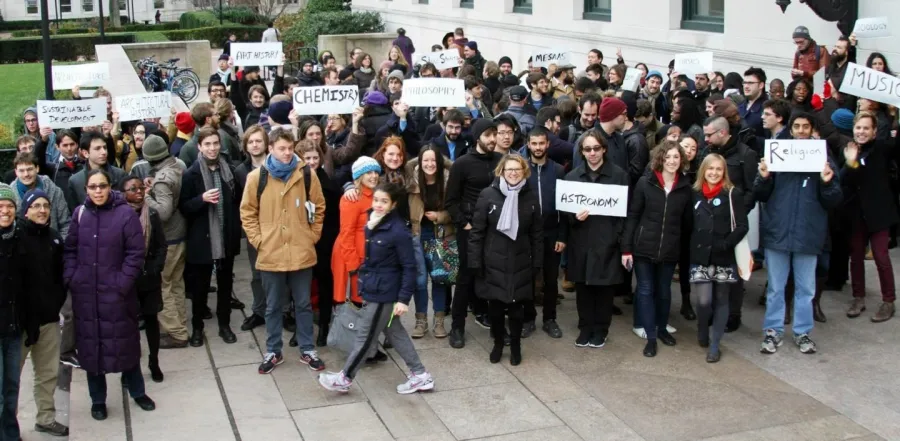Huge Boost to Graduate Worker Movement as NLRB Certifies Columbia Union

For Immediate Release: Monday, Dec. 18, 2017
Board rejects Columbia objections to December 2016 union vote and certifies GWC-UAW; workers call on administration to fulfill legal obligation to bargain with largest-ever graduate workers union at a private university
WASHINGTON, DC—The National Labor Relations Board (NLRB) has upheld an overwhelming December 2016 vote in favor of unionization and certified Graduate Workers of Columbia-UAW (GWC-UAW) as the union for 3,000 research and teaching assistants who work at the Ivy League school. GWC-UAW leaders immediately requested that the administration fulfil its legal obligation to start good-faith negotiations for a contract, which would cover the largest-ever group of unionized RAs and TAs at a private university.
“After months of disingenuous delays by Columbia, we are excited to win certification of our union,” said Olga Brudastova, a PhD student and teaching assistant in Civil Engineering and Engineering Mechanics. “No more excuses. The Columbia administration needs to respect the law and start bargaining immediately.”
The Board rejected Columbia’s objections filed last December aimed at throwing out the election results, stating: “Here, the Employer has failed to carry its burden. The Employer’s evidence shows that the Region’s inconsistent handling of voter- identification procedures potentially affected just four ballots at most. The election covered a unit of over 4,000 eligible voters, in which the Petitioner won by a 979-vote margin. In these circumstances, we find no reasonable doubt as to the fairness and validity of the election.”
Decision comes amidst growing criticism of Bollinger’s refusal to respect democracy
Columbia President Lee Bollinger, the highest-paid university leader in the United States, and his administration face growing criticism for refusing to respect the overwhelming RA and TA support for the union. Not only did workers vote 1602-623 in favor of the union in December, but an even larger majority signed a petition early in 2017 urging the university to drop the objections—and well over 2,500 have now filled out bargaining surveys in preparation for contract negotiations, as well as a new petition urging Columbia to bargain sexual harassment protections.
Since last fall, faculty, students, alumni, and elected officials have also weighed in, urging the administration to respect the vote and start bargaining. In March, after the regional NLRB originally recommended rejecting Columbia’s objections, the campus newspaper editorial board asserted that “Honoring graduate unionization has become a matter of democratic principle.”
On September 20, RAs and TAs from Columbia testified in front of Representatives Jerry Nadler and Grace Meng, and other notable representatives, on how the university’s refusal to bargain with their union has impacted their lives. In November, Senator Bernie Sanders sent letters to the presidents of Columbia, Harvard, and Boston College, asking them to “support the legal rights of research and teaching assistants to form unions and bargain in good faith with them.” Graduate workers across the country rallied on the one year anniversary of Trump’s election to protest managers at these universities who would rather fight against their graduate workers than work with them to oppose harmful Trump policies like the proposal to tax tuition waivers and university endowments.
Columbia is also increasingly out of step with other university administrators. While observers have followed Columbia closely after GWC-UAW won the landmark NLRB decision last August restoring the right to collective bargaining, at least six other university administrations have agreed to bargain with graduate workers where a majority vote favored unionization—NYU, Cornell, The New School, American University, Brandeis University, and Tufts University.
“Columbia needs to wake up and get on the right side of history,” said Julie Kushner, the Director of UAW Region 9A. “After nearly three years of delays by Columbia, majority support for GWC-UAW is only growing and shows no sign of subsiding, especially in the era of Trump when a strong voice is so important on campus and in our broader communities.”
